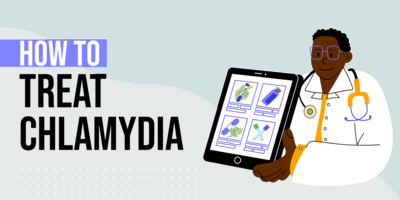
How to Treat Chlamydia
Chlamydia is a bacterial infection that is spread by sexual contact, according to the CDC. It is one of the most...
Read moreHelp patients book appointments with you on Solv. It's free!
5 instant-book locations


Help patients book appointments with you on Solv. It's free!
According to the CDC, everyone between the ages of 13 and 64 should get tested for HIV at least once as part of routine health care. However, some people are at higher risk and should get tested more often. These include men who have sex with men, people who have had sex with an HIV-positive partner, people who have had more than one partner since their last HIV test, and those who share needles or work with injection drugs.
Getting tested for HIV is crucial for a number of reasons. Firstly, early detection can lead to early treatment, which can greatly improve long-term health and extend life expectancy. Secondly, knowing your HIV status can help you make informed decisions about your sexual health and prevent transmission to others. Finally, regular testing is key to controlling the HIV epidemic. According to the CDC, about 14% of people with HIV in the United States do not know they have it and may be unknowingly transmitting the virus to others.
Urgent care and walk-in clinics offer a convenient option for HIV testing. The Urgent Team in Columbus, MS, located at 1503 US-45, is a highly-rated clinic that offers same-day and next-day appointments through Solv’s website and mobile app.
Primary care providers are another reliable option for HIV testing. They can provide ongoing care and support if you test positive, and can also provide preventative services if you are at high risk.
Free STD testing is available at community health centers in Columbus and nearby cities. These centers provide confidential testing and counseling services.
At-home testing kits are another convenient option. These kits can be ordered online and used in the privacy of your own home.
While specific data for Columbus, MS is not readily available, the CDC reports that the Southern United States has the highest rates of new HIV diagnoses, people living with HIV, and HIV-related deaths of any U.S. region. The prevalence of HIV in nearby counties such as Webster County, Fayette County, and Polk County can provide a general idea of the HIV situation in Columbus.
Risk factors for HIV in Columbus are similar to those in other parts of the country. These include unprotected sex, multiple sexual partners, sharing needles, and lack of regular testing.
In addition to HIV, other STDs such as gonorrhea, chlamydia, syphilis, and hepatitis are also prevalent in Columbus. Regular testing for these STDs is also recommended, especially for those in high-risk groups.
Solv has strict sourcing guidelines and relies on peer-reviewed studies, academic research institutions, and medical associations. We avoid using tertiary references.
Everyone between the ages of 13 and 64 should take an HIV test at least once in their lives. Some people are more likely to get HIV and should be tested more regularly. Those who have had sex with an HIV-positive partner, those who inject drugs, sexually active gay men, and those who have unprotected sex are all included. You should get checked every 6-12 months if you have any of these risk factors.
Antibodies created by your body in reaction to the virus are examined in HIV tests. A blood test or a sample of cells obtained from the inside of the cheek can be used to do this. After that, the sample is transported to a lab, where a technician will look for antibodies.
It can take a long time for your body to build enough antibodies for an HIV test to detect the illness if you become sick. It may take 3-12 weeks for your blood to contain adequate antibodies. Even if you have HIV, you could have a negative test result during this time.
Because the sample must be sent to a laboratory for investigation, most HIV test results might take anywhere from a few days to several weeks. On the other hand, some Columbus clinics or doctor's offices may offer rapid HIV testing, which can deliver a diagnosis in as little as 20 minutes. Rapid HIV testing involve a little sample of blood or fluid obtained from the mouth. You'll need a follow-up blood test to confirm the diagnosis if a fast test comes up positive.
A variety of factors influence the cost of an HIV test, including the type of test you receive, the location where you are tested, and whether or not you have health insurance. HIV testing may be provided for free or at a low cost by some clinics or health authorities. If you're a college student, you might be able to get free HIV tests through your school.
The majority of insurance coverage cover HIV testing. The Affordable Care Act mandates that all new health plans provide free HIV testing for those aged 15 to 65. If you have any doubts about what is covered under your individual health plan, you can always call your insurance company or go to their website.
Many Columbus health clinics, doctor's offices, and the health department offer HIV testing. Some pharmacies with on-site clinics may also be able to give HIV testing. Even though some clinics accept walk-in appointments, making an appointment ahead of time will save you time and ensure that you receive your test on the same day.
Yes, Solv offers same-day and next-day HIV testing appointments. We collaborate with thousands of healthcare providers across the country to make it easier for everyone to access the medical assistance they require quickly and conveniently. On our website, you can choose a physician near you and make an appointment right now.
Simply type "HIV test" and your location into our website's search box. You'll find a list of providers and their available appointment times on the next page. Fill out the form to arrange an appointment at a time and location that is convenient for you. Make certain that your appointment is for "HIV testing."
Although there are several home HIV tests available, not all of them are accurate or FDA-approved. For a home test, you'll need a swab from the inside of your mouth or a blood sample taken with a finger pricker. If you get a positive result on a home HIV test, you should see a doctor to confirm the diagnosis and start treatment.
Annual Wellness Exam in Columbus
Chickenpox Vaccine in Columbus
DOT Exam in Columbus
Ear Wax Removal in Columbus
Eye Exam in Columbus
Flu Shot in Columbus
Hepatitis Vaccine in Columbus
Measles Vaccine (MMR) in Columbus
Pap Smear in Columbus
Physical Exam in Columbus
Shingles Vaccine in Columbus
Sinus Infection Treatment in Columbus
Sports Physicals in Columbus
Tetanus Shot in Columbus
Typhoid Vaccine in Columbus
Well-Woman Exam in Columbus
Yellow Fever Vaccine in Columbus
A1C Test in Columbus
CMP Test in Columbus
Chlamydia Test in Columbus
Diabetes Test in Columbus
Gonorrhea test in Columbus
H Pylori Test in Columbus
HIV Test in Columbus
Hepatitis test in Columbus
Herpes Test in Columbus
Mono Test in Columbus
Pregnancy Test in Columbus
STD Testing in Columbus
Strep Test in Columbus
Syphilis test in Columbus
TB Test in Columbus
Thyroid Test in Columbus
Trichomonas Test in Columbus
Vitamin D Test in Columbus
Tips, advice, news—your resource to stay healthy and safe while improving your experience with healthcare providers when you need them.